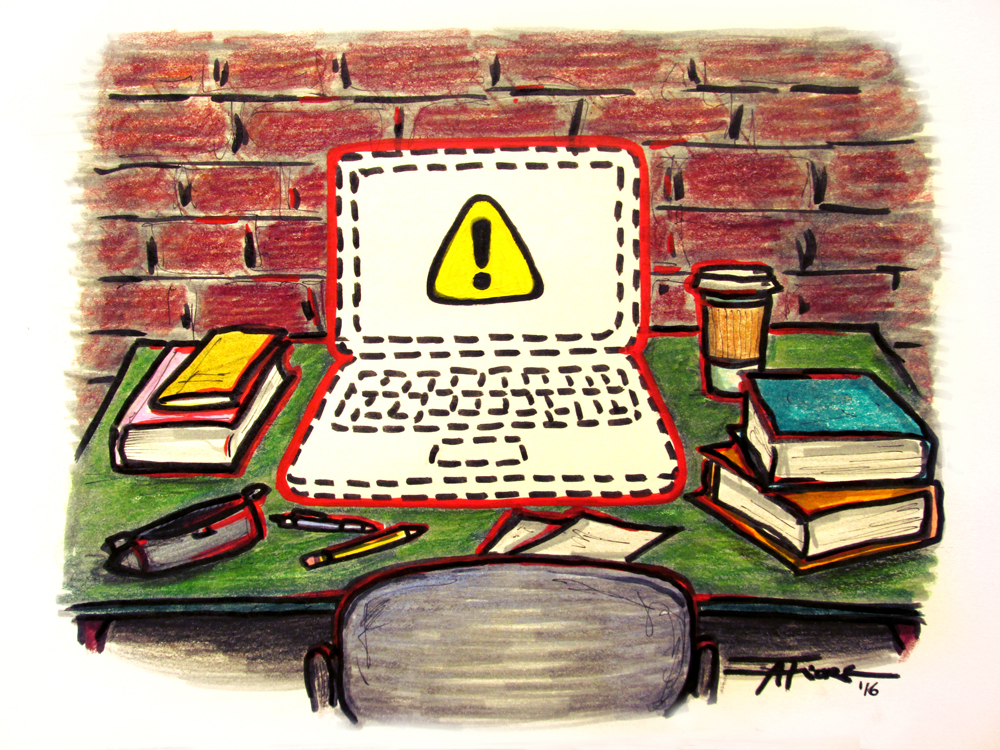It is no secret that McGill students are frequent victims of laptop theft. Whether it takes place on campus or off, there is no shortage of stories of students leaving their desks, or even turning their attention from their belongings for a few seconds, only to find their laptops gone the next moment. Just recently students tabling at Winter Activities Night were given a grim reminder of this issue when a Students’ Society of McGill University (SSMU) volunteer went around alerting them to keep a vigilant eye on their belongings after a laptop was stolen in the midst of the crowded fair. Students feel unsafe on campus; there are steps students can take to protect their property, but ultimately the university must also do more to increase the sense of security.
Posters about laptop theft posted around campus, frequent McGill Reddit PSAs, and even the Security Tracking of Office Property (STOP) program—a service that allows staff and students to register their laptops and affix a security plate to their laptops—give little doubt that there is enough awareness about the problem. Yet, this has not stopped the thefts from occurring. This is arguably due to how often the crimes go unnoticed and unpunished as a result of the McGill community’s general lack of response and reluctance to report suspicious activity. McGill students and other members of the Montreal community must make a more active effort to report any crimes they witness around campus.
While it is difficult to make an underlying statement about Montreal law enforcement and laptop theft, it is rather easy to find stories about the crime being largely ignored by the police. Of course, it is somewhat understandable that law enforcement views the issue of laptop theft as a low priority. Despite this, it is not too far-fetched to suggest that people in the city could at least help increase the amount of police response to laptop thefts.
For example, the police are unable to effectively respond to thefts occurring in Montreal due to the lack of proactive reporting and sharing of information from the victims and witnesses of the crime. In 2014, a research team at McGill published a study on bicycle theft around the city, reporting that out of 20,000 bicycle thefts occurring in the city every year, only about 2,000 cases are actually reported to the police. Obviously, the impact of laptop theft and bicycle theft and the subsequent response is not entirely comparable; however, it is difficult to deny that the study shows a worrying trend of citizens’ inability to consistently report criminal activities.
Naturally, the primary solution to the issue of theft is a call for students to keep a closer watch on their belongings and to never leave their laptops unattended—something that has clearly not worked so far. Increased personal vigilance alone will not address the issue of McGill students feeling unsafe around their campuses; it may only lead to increased paranoia and stress.
Students that have ever spent their nights at the McLennan-Redpath Library complex has had the experience of watching a peer’s belongings as they make a quick trip to the washroom or Première Moisson. Exchanges such as this underline what the McGill community must do to make a collective effort to keep the campus safe from theft. On top of looking after a fellow colleague’s possessions when asked, students should make an effort to be on the lookout for suspicious activities in areas where laptops are often left unattended.
Regardless of how publicized the issue becomes and how careful individuals attempt to be, thieves will always find the opportunity and incentive to steal—unless there is a higher risk of repercussions. In this case, it seems logical that the university take more concrete steps to directly stop the theft from occurring or at least increase the level of response to them. Programs, such as STOP, that seek to protect students’ property when theft occurs is one thing—creating a safer campus is another. For the time being, it falls under the responsibility of McGill students to create cooperate in putting pressure on would-be thieves and consequently pave the way to a safer campus.








